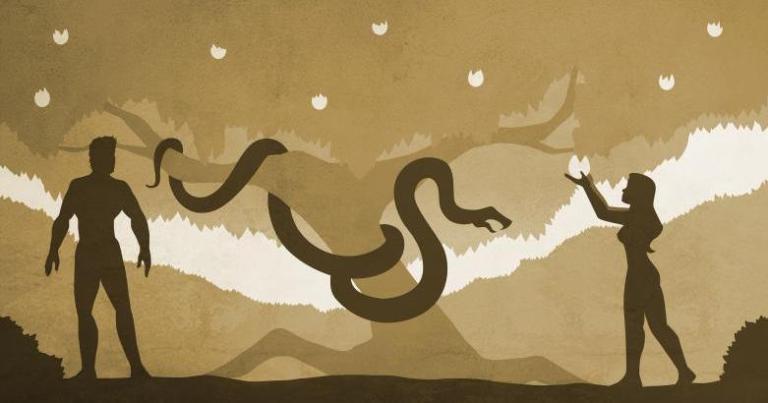Eve: Mother to All
By David C. Cramer
Read Genesis 1:1–5:2; Galatians 3:10-4:7
I’m 38 years old and have been in church my entire life. By my math, that means I’ve sat through close to 2,000 sermons, including approximately 38 sermons on Mother’s Day. And, yet, I can’t recall ever hearing a sermon extolling the virtue of Eve—and this despite her being called “the mother of all who live.”

I’ve heard sermons preached on Eve, but they’re always on temptation, sin, and the fall. And, yes, those things are part of her story, but they don’t define Eve. There’s so much more to Eve that we overlook.
Indeed, I would venture to say that Eve has been more maligned throughout history than any other human. Literally all of the sin, evil, pain, suffering, and death in the world has been blamed on her. For making one bad choice, she has become the symbol of human weakness, ignorance, and sin—and, in particular, of the weakness, ignorance, and sin of women.
This is how our society—as with so many societies around the world and throughout history—treat women, isn’t it? Women are defined by their worst moments. One bad decision, one lapse of judgment, and that becomes their identity: the seductress, the adulterer, the prostitute.
Meanwhile, King David’s career includes rape and murder, and yet he goes down in history as “a man after God’s own heart.” His misdeeds are used to excuse the misconduct and bad character of other powerful men: King David raped and murdered, and he was a man after God’s own heart, chosen by God to lead a nation! Who’s to say that this powerful white male politician isn’t God’s chosen instrument too, despite his long litany of scandals?
If it seems there’s a double standard here, that’s because there is a double standard here. Powerful men are given chance after chance to redeem themselves, while for women, it’s one strike, and you’re out.
Whole theologies of men and women have been designed to support this disparity, and many of them originate from these early chapters of Genesis. Here we’ll mention three.
First, some argue that because the man was created first and the woman was created from the man to be his “helper,” this suggests that women are inherently weaker and subservient.
But this argument doesn’t hold up biblically. In Genesis 1, God states, “Let us make human beings in our image, to be like us. They will reign over the fish in the sea, the birds in the sky, the livestock, all the wild animals on the earth, and the small animals that scurry along the ground” (1:26).
The narrative continues, “So God created human beings in God’s own image. In the image of God, God created them; male and female God created them” (1:27).
There is equality in the act of creation, as male and female alike are created in the image of God. And far from suggesting that what is created earlier is superior, Genesis suggests that creation keeps getting better with more additions. Thus, while God says that creation is “good” after each of the first five days of creation, after the sixth day when God creates humans, God looks over all creation and declares it “very good!” (1:31).
In the next chapter, when the creation of man and woman are narrated in greater detail, again there is no suggestion of inequality. When God decides to create woman to provide a “helper” for man, there is no indication that “helper” means “servant.” Instead, the “helper” is created to provide companionship, as Genesis describes how “the two are united into one” (2:24).
When I seek out help for a project, usually I go to someone who is more of an expert in the area than I am. In the Psalms, even God is given the name Eliezer, which means “God is my helper,” the same word that is used in Genesis. “God is our refuge and strength,” cry the Psalms, “always ready to help in times of trouble” (46:1). But surely God is not subservient to Israel!
So the notion that women are inherently weaker or subservient based on creation design doesn’t hold up scripturally. But there is yet a second theological argument made: whatever God may have intended in creation, it was still the woman who was deceived and gave in to temptation and sin.
This argument conveniently overlooks on important detail in the story: the man was with the woman the whole time! After describing the verbal interchange between the woman and the serpent, the text states this: “The woman was convinced. She saw that the tree was beautiful and its fruit looked delicious, and she wanted the wisdom it would give her. So she took some of the fruit and ate it. Then she gave some to her husband, who was with her, and he ate it, too” (Gen. 3:6).
The man is standing there listening to the conversation the whole time and is willing to let the woman quite literally take the fall. When God asks what happened, the man responds, “It was the woman you gave me who gave me the fruit, and I ate it” (2:3). This is the first instance of one of the most common deflection tactics: blaming men’s misdeeds on the women in their lives.
But God doesn’t fall for it. God declares culpability and punishment for all three parties involved: serpent, woman, and man.
But if neither creation order nor the fall indicate inequality, from where does inequality come? Some argue, third, that God mandates inequality as a result of the fall, in God’s curses on the serpent, woman, and man.
Speaking to the woman directly, God declares this: “You will desire to control your husband, but he will rule over you” (3:16).
Right there it is: the husband, or man, will “rule over” the wife, or woman. And, indeed, throughout history and across human societies, we have seen this to be the case: men rule over women; husbands rule over wives.
But within these very curses themselves is the seed of their undoing. Just one verse prior is a line that some have called the “proto-gospel.” This is the first prophecy of Scripture, and it’s declared directly by God.
Addressing the serpent, God states this: “I will cause hostility between you and the woman, and between your offspring and her offspring. He will strike your head, and you will strike his heel” (3:15).
God says that from the offspring of this woman will come one who will strike the head of the serpent, the deceiver. As Christians, we proclaim that this someone is none other than Jesus himself. Through his crucifixion, Jesus took the serpent’s strike on his heel. But through his incarnation, resurrection, and ascension, Jesus struck the head of the serpent. In so doing, Jesus reversed the curse.
As Paul writes to the Galatians, “Christ has rescued us from the curse pronounced by the law. When he was hung on the cross, he took upon himself the curse for our wrongdoing. For it is written in the Scriptures, ‘Cursed is everyone who is hung on a tree’” (3:13).
Paul goes on to explain: “When the right time came, God sent his Son, born of a woman, subject to the law. God sent him to buy freedom for us who were slaves to the law, so that he could adopt us as his very own children. And because we are his children, God has sent the Spirit of his Son into our hearts, prompting us to call out, ‘Abba, Father.’ Now you are no longer a slave but God’s own child. And since you are his child, God has made you his heir” (4:4–7).
Through the work of Jesus, who was born of a woman, we are able to receive God’s Spirit and be adopted into God’s family. And within God’s family, we find a home where the curse is reversed.
Thus Paul writes in that same passage: “For you are all children of God through faith in Christ Jesus. And all who have been united with Christ in baptism have put on Christ, like putting on new clothes. There is no longer Jew or Gentile, slave or free, male and female. For you are all one in Christ Jesus” (3:26–28).
In Christ Jesus, we have become one, just as God intended human relationships to be in creation. And in this oneness in Jesus, there is no room for power imbalances between man and woman, husband and wife, or between any other human divisions. Those are all the curse of the fall, but in Jesus the curse is reversed.
Thus we find already in the story of Eve the story of God’s fierce faithfulness. And we also discover a story of Eve’s fierce faithfulness to God. Eve refuses to be defined by one bad decision in her life. In fact, it is only after the fall and after the curse that the woman receives her name: “Eve, because she would be the mother of all who live” (3:20).
Instead of being defined by her past mistakes, Eve leans into her new name and claims her own agency in the narrative. As she gives birth to her firstborn son, Cain, she declares her first recorded words as Eve: “With the Lord’s help, I have produced a man!” (4:1).
Eve partners with God to continue God’s work of creation. In so doing, she lives into her name as “the mother of all who live.” She is fiercely faithful to the work with which God had entrusted her.
We honor Eve’s memory not be reinforcing the inequalities that resulted from the fall. Rather, we do so when we declare that, through Eve’s offspring, the curse is reversed!
Sin and Death have been struck down at their head. And we are now set free to live as children of God, filled with the Spirit, in the family of Christ Jesus, where there is no male or female, for together we are made one.
Thanks and honor be to Eve, and all praise and glory be to her offspring, our Lord and Redeemer, Jesus Christ.
This post is part of the series Fiercely Faithful: Rad Women of Scripture.













